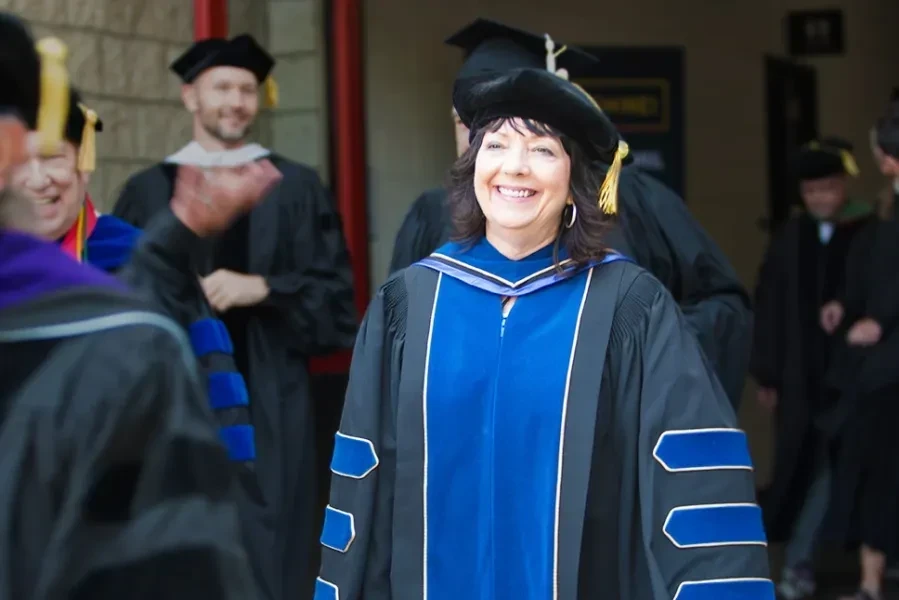Recognized as the pinnacle of education, a doctoral degree represents a person’s steadfast commitment to lifelong learning and their desire to become a definitive expert in their chosen field of study. The doctoral community is an exclusive group of thought leaders, scientists, and subject-matter experts who solve problems and conduct research at the highest levels of the public and private sectors. For these reasons, students and prospective doctoral candidates often ask how long it takes to earn a doctoral degree and what it means for their future.
Since the dawn of the millennium, the United States has seen a surge in college graduates committing to advanced degrees. The U.S. Census Bureau estimates that 4.5 million people now hold a doctoral degree, an increase of 125% since 2000.
A Different Kind of Commitment
When choosing whether or not to commit to a college degree, you have to ask yourself how much time you can commit to your education. After all, a doctoral degree program requires a different kind of commitment.
If you’ve been successful in the master’s program, you can be successful in a doctoral program, but you will need to be willing to put in the time. It’s not the intellectual challenge, however it’s time management that’s the biggest hurdle for many students.
Unlike a master’s degree program, which is typically comprised of roughly 30 credits, depending on the specific degree, a doctoral degree requires nearly twice as many credits. At the University of Arizona Global Campus (UAGC), for example, the Doctor of Psychology, Doctor of Philosophy in Human Services, and the Doctor of Philosophy in Organizational Development and Leadership are each comprised of 62 credits. The UAGC Doctor of Philosophy in Education is comprised of 59 credits.
Typically, it can take anywhere from 3 to 5 years or more to finish a doctoral program, but this ranges depending on a variety of factors, including the program design and transfer credits applied to the degree, among others.
These programs are longer because you must demonstrate a comprehensive understanding of the material and the research involved. Outside of the core courses and specialization courses, doctoral programs can include capstone projects, seminars, and in-residence workshops, as well as dissertations.
Earning Your Doctoral Degree at a Steady Pace
The UAGC doctoral programs also boast the flexible class schedule that students have come to expect from the online University. Doctoral students take one course at a time, and courses typically last from six to nine weeks. You will also have the opportunity to attend virtual In-Residence Workshops from the comfort of your home. Even your doctoral research defense can be conducted remotely thanks to technology. While most of the learning is done online, doctoral students have the opportunity to demonstrate their knowledge in person during three in-residence weekend workshops.
In a doctoral program such as those offered at UAGC, you’ll come together and work face-to-face with professors, other students, and UAGC student support services.
While some students transition immediately from one degree to the next, others may have an opportunity to bring with them a lifetime of educational and professional experience that can help them graduate faster. For example, at UAGC doctoral students may be able to transfer up to 30 approved credits toward their degree programs.
A Support System to Keep You on Track
As you ascend from one level of education to the next, a certain amount of anxiety is expected. After all, a doctoral program requires the largest commitment. Fortunately, online institutions such as UAGC have a built-in support system that is always accessible via the online classroom. The University’s Writing Center is staffed with experts who can help review assignments, and the Library is the ultimate resource for research. Both are available 24 hours a day, seven days per week.
Additionally, UAGC boasts a Career Services team that specializes in training students for a future beyond graduation, as well as a bevy of student organizations that allow you to build your network and gain valuable insight from professionals in your chosen field.
If you’re considering becoming one of the two percent of Americans who hold doctoral degrees, you’ll want to gather as much information as possible before making your decision. Talk with a UAGC advisor about your options and the commitment involved, and start planning for your future today.
